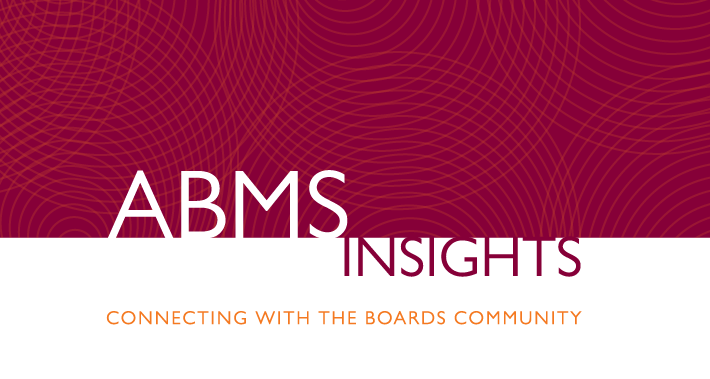

When American Board of Medical Specialties (ABMS) Member Boards evaluate their board’s certification programs to ensure they accurately measure physician knowledge, they are also able to identify practice gaps in their respective fields of medicine. The Member Boards share this information with specialty societies to fill educational gaps on their formative assessments. Societies then use the de-identified data to improve their continuing medical education (CME) offerings.
The following are a handful of examples of how different boards use this data-driven approach to enhance lifelong learning with the ultimate goal of improving patient care.
Sharing Summary Reports
In 2022, the American Board of Dermatology (ABD) invited 22 specialty societies to complete a gap report. “The goal was to seek the societies’ expert perspectives of practice gaps in the field, including gaps their experts believe that dermatologists could and should improve, key articles to consider that best expand or update knowledge in their society’s areas of expertise, and any other advice for us to consider when creating assessment content,” explained Erik Stratman, MD, ABD’s Associate Executive Director for Research and Continuous Improvement. Ten societies completed the gap report. ABD research staff are now working on processes to disseminate and integrate the suggestions within the assessment and continuing certification program structure. As an example, suggested articles would be given to the article-based question writers for consideration for CertLink® questions.
Additionally, ABD recently assessed various internal sources of board certified dermatologist data for 2022 and 2023. Among them were practice gaps identified by each subspecialty gleaned from their practice assessment program, the most often missed topics in CertLink assessments, and the most selected articles for article-based assessment. ABD shared the data with all the societies that completed the gap report to use for their own educational planning.
Since 2019, the American Board of Allergy and Immunology (ABAI) and American Board of Plastic Surgery (ABPS) have been providing an annual summary of physician performance on their respective longitudinal assessments.
ABAI has been providing a summary report of lower performing areas to both the American Academy of Allergy, Asthma and Immunology and American College of Allergy, Asthma and Immunology. The societies, in turn, bring this information to their respective CME committees. Topic areas of immunodeficiency and immune hypersensitivity have historically posed a greater challenge to board certified allergists and immunologists than other areas, noted ABAI President Michael Nelson, MD, PhD. Physician performance on the most recent Continuous Assessment Program has improved in both areas, he added.
ABPS reports to several specialty/sponsoring societies, which consider this information when tailoring new educational offerings for plastic surgeons, stated Keith E. Brandt, MD, ABPS Executive Director. The societies are also providing board certified plastic surgeons with additional educational material that is integrated into the annual ABPS assessment.
The American Board of Internal Medicine (ABIM) shares Specialty Knowledge Gaps Annual Reports by internal medicine discipline with physicians and specialty societies. The information focuses on areas of relative strength and weakness based on physician performance on Longitudinal Knowledge Assessments (LKA®). The charts display overall average performance (the average percentage of questions answered correctly) in the top-level blueprint areas for the discipline as well as performance across various demographic categorizations within that discipline. ABIM also distributes the reports to the appropriate societies to show where there are knowledge gaps in the discipline.
The American Board of Physical Medicine and Rehabilitation is in the process of establishing a similar collaboration with the American Academy of Physical Medicine and Rehabilitation.
The American Board of Obstetrics and Gynecology (ABOG) recently implemented methods to improve the usability of its data for its article-based assessments taken in 2023. ABOG researchers are currently reviewing the data on assessment items on which the average score for certified obstetricians/gynecologists fell below the 80 percent benchmark set for satisfactory completion. They are trying to determine whether these scores are a function of the items presented or of the physicians’ abilities/knowledge. ABOG plans to share the results and feedback with specialty societies in 2025.
Posting Reports Online
Some Member Boards post physician performance reports on their websites to reach larger audiences.
The American Board of Anesthesiology (ABA) posts its High Priority Topics Reports (HPTRs), providing actionable insights about CME that board certified anesthesiologists need most to develop and maintain their unique knowledge and skills. Previously, ABA shared the semi-annual reports on a requested basis, but started posting them in 2021. “We made the decision to post the HPTRs so that the valuable information they offer CME providers and others could be more easily accessed without having to request it,” stated ABA Chief Assessment Officer Ann Harman, PhD. “We hope the open access to the information they contain will help reach a broader range of organizations and individuals creating educational content for board certified anesthesiologists,” she added. Among the CME providers that routinely use the HPTRs are the American Society of Anesthesiologists, Society of Pediatric Anesthesia, and Society of Critical Care Anesthesiologists.
The American Board of Pediatrics (ABP) has made its performance reports available online since 2020. The annual reports provide a graphical summary of pediatrician performance in each of the 15 content areas assessed by MOCA-Peds. Similarly, ABIM posts its Specialty Knowledge Gaps Annual Reports for select LKAs on its website.
Collaborating in Other Ways
Member Boards collaborate with specialty societies beyond performance reporting to fill practice gaps.
One of the collaborations between the American Board of Emergency Medicine (ABEM) and the American College of Emergency Physicians (ACEP) involve generating content for Key Advances in the MyEMCert modules for continuing certification. ABEM uses select clinical policy alerts generated by ACEP as Key Advances content. Of the 50 questions on a MyEMCert module, approximately 35 percent are Key Advance questions that revolve around an ACEP clinical policy alert, practice advance, or suggestions from the literature. For each Key Advance topic, ABEM develops a three- to seven-page synopsis, and for some, even has a short video created. The Key Advance topics and other resources are distributed to more than 45,000 emergency medicine physicians and are publicly available. ABEM identifies knowledge gaps in the MyEMCert modules based on physician performance and shares a report of learning opportunities publicly on its website and with emergency medicine societies. ACEP and other emergency medicine societies use that information to design educational programs to improve the specialty.
The American Board of Family Medicine (ABFM) shares data with state chapters of the American Academy of Family Physicians about certification participation in Knowledge Self-Assessment (KSA) activities to help the chapters plan group KSA activities. In partnership with the Association of Family Medicine Residency Directors, ABFM shares data and reports summarizing trainee and graduate performance with all the national family medicine residency programs with the intent of using the information to tailor their program curriculum.
ABPS also shares reports with program directors every three years about knowledge gaps identified during the Written (Qualifying) Examination administration. The program directors consider this information when tailoring their program curriculum. The American Board of Medical Genetics and Genomics shares summary reports with all program directors about knowledge gaps identified in the in-training examination and in each specialty certifying examination.
Physicians and medical specialists are dedicated to lifelong learning. ABMS Member Boards are committed to partnerships with specialty societies to support physicians and medical specialists in their pursuit of professional growth and excellence through innovative data-driven approaches, working in tandem to ensure relevant CME is created to address identified knowledge gaps.
© 2024, American Board of Medical Specialties.
-
Read More:
- ABMS Insights |
